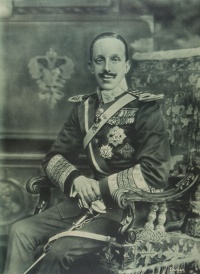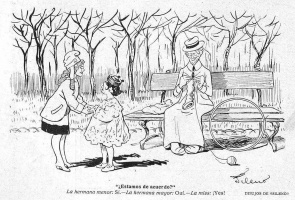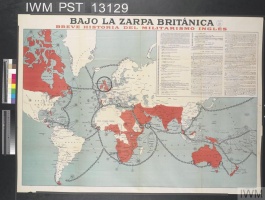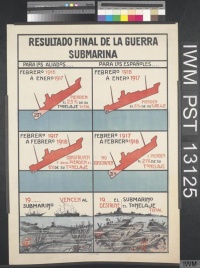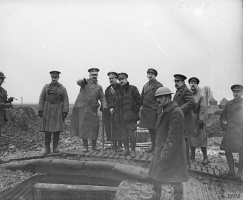Introduction↑
Until recently, as is the case with most neutral countries, the various ramifications of the Great War on Spain had been hardly investigated by historians. The few studies available before the 1970s had mostly been written without regard to international studies and in some cases were basically introductory works. Since then, however, and in particular starting in the early 2000s, a number of significant works have been published that have helped to begin to place the Spanish case within the international context.[1] This progression also explains the development of research into Spanish pacifist and Europeanist positions and initiatives and into the important role played by Alfonso XIII, King of Spain (1886-1941) at the head of the Oficina Pro Cautivos (Pro-Captives Office). However, while in the case of pacifist groups some research has been published in the last decade, in the case of the king’s humanitarian initiative, despite some brief accounts, no line of research has been developed to its full potential.
Taking into account this historiographical context, this article aims to offer a general explanation of these two aspects of which little is known beyond the Spanish borders. First, I consider the main pacifist and Europeanist initiatives within Spain, which shared close ties with the main European groups. Second, I analyse the humanitarian policy of Alfonso XIII, which also achieved a certain amount of international relevance during and after the years of conflict. Before I do so, however, I first present a cursory outline of the various political positions that emerged after Eduardo Dato’s (1856-1921) declaration of Spanish neutrality.
The Policy of Neutrality and Public Discourses↑
After the official declaration of neutrality, the view that Spain could not get involved in the conflict was initially shared by all sections of society. However, three voices soon broke this apparent consensus. The first was that of Alejandro Lerroux (1864-1949) who declared, on 10 August in the pages of El Radical, that neutrality was “a cowardly inhibition”. He was followed by the leader of the Reformist Party, Melquíades Álvarez (1864-1936), who demanded a neutrality that was benevolent to the Entente, and Álvaro de Figueroa, Count of Romanones (1863-1950), who on 19 August in the Diario Universal wrote his well-known article “Neutralities that kill”. However, Eduardo Dato had little difficulty overcoming these early signs of dissent.
Nevertheless, as the months passed, the initial consensus gave way to debate about the nature of neutrality, which subsequently developed into a heated controversy. Many parties began to question the arguments that supported state neutrality, and talk of sympathies with one side and hatred of the other began to surface. Among those who sympathized with the Central Powers were the Court and the aristocracy as a whole – led by María Cristina (1858-1929), Queen, consort of Alfonso XII, King of Spain – and the Carlist and Maurist parties along with the army and the majority of the Catholic Church. Among the prominent supporters of the Entente were the various republican groupings, the socialist and reformist parties and, especially, the intellectuals. The great majority of Spanish writers saw the war as a new opportunity that could lead to a profound change in Spain. In broad terms, the war could serve as a resounding corrective to the mediocrity and the loss of national feeling that pervaded in Spain, and a feeling captured by José Ortega y Gasset (1883-1955) in his famous conference “Old and New Politics”, held in Madrid in March 1914.
Towards the end of 1915, intellectuals such as Miguel de Unamuno (1864-1936) and Luis Araquistáin (1886-1959), as well as both Entente and German diplomats, began to refer to the division that had emerged in Spanish society as being between supporters of France and England and those who sympathized with Germany. In fact, this division had already begun to form in the final months of 1914. The first shot fired in the war of words was, in fact, from the pacifist camp with the publication of the neutralist Manifest del Comitè d’Amics de la Unitat Moral d’Europa (Manifest of the Committee of Friends of the Moral Unity of Europe), written by the Catalan intellectual, Eugenio d’Ors (1881-1954), at the end of November 1914, in Barcelona. In response to this manifesto, which was regarded as an unacceptable demonstration of equidistance and neutralism, a group of intellectuals added their names to the Manifest dels Catalans, in March 1915, a demonstration of the dominant pro-Entente feeling in Catalan republican circles. A few months later, on 9 July, came the Manifiesto de adhesión a la naciones aliadas (Manifesto of Solidarity with the Allied Nations), written by Ramón Pérez de Ayala (1880-1962) and promoted by the Ateneo de Madrid and the journal España, still edited at the time by José Ortega y Gasset. The stated aim of this text was to ensure that Spain ceased to resemble “a nation without echo in the bowels of the world” by proclaiming their solidarity with the Allied cause. Like their pro-Allied counterparts, the Germanophile intellectuals made their presence felt as a collective with a manifesto, in this case entitled Amistad Hispano-Germana (Spanish-German Friendship) and published in the Maurist newspaper, La Tribuna, on 18 December 1915. This text, written by Jacinto Benavente (1866-1954), emphatically rejected the idea that the war was a confrontation of freedom and democracy against the barbarism and obscurantism supposedly embodied by Germany.
From then on, the friend-or-foe dynamic unfolded in all its pomp, and stereotypical accounts of the Germans and French were to be found in virtually all publications, gatherings and conferences. This was reflected in the covers of magazines such as España, illustrated by Luis Bagaría (1882-1940), or those of the Barcelona-based Iberia. In this context, with financial support from the French, British and Italian embassies, pro-Allied intellectuals proliferated in newspapers and magazines; on trips to the Western Front; and at Hispanic congresses and French academic conferences. This situation, which came to be described as a “civil war of words”,[2] resulted in the few small groups of neutralists, pacifists and Europeanists being suspected of acting on behalf of Germany. The rigid division between pro-Entente and Germanophiles and the process of radicalization in the heat of war came to bear on Jose Ortega y Gasset, whose philosophical training had been completed in Germany. Despite the fact that he was manifestly pro-Entente, he was vilified by both sides: he was accused of being the “leader of the Spanish Germanophobe movement” by the German periodical, Kölnische Volkszeitung, and of being an “unconditional” Germanophile by La Petite Gironde in April 1915.[3]
In the following months, particularly from the second half of 1916 and especially during the spring and summer of the following year, this division would increasingly be related to domestic political positions. On the one hand, the vast majority of the pro-Entente sectors exerted considerable pressure in favour of the rupture of relations with Germany – particularly after it resumed the unrestricted submarine campaign in January 1917 – and, especially in the last months of the war, in trying to force the monarch to undergo a series of pro-democracy internal reforms. On the other hand, the great majority of pro-German sectors – as was the case in other neutral countries such as Argentina – sought to defend state neutrality in order to ensure the maintenance of the Restoration system, gravely threatened since the crisis of the summer of 1917.
Neutrality, Europism, and Pacifism↑
In addition to war correspondents such as Carmen de Burgos (1867-1932) and Sofia Casanova (1861-1958); activists such as Carme Karr (1865-1943); and the anarchist movement, that declared its neutralism from the very beginning of the war (and affirmed this position in the Congress of Ferrol in 1915), there were few Spanish initiatives of a pacifist and neutralist nature. It is therefore essential to highlight the role taken on by the Catalan intellectual, Eugeni d’Ors. His trajectory during the war is vital in explaining not only the development of some of the Europeanist initiatives within Spain, but also to shed light on their relationships with European pacifist movements.
Prior to the beginning of the Great War, d’Ors had presented a conception of Europe centred on the presence of two cultures, one Latin-Mediterranean and the other Germanic, which together had led to the construction of a unique and dynamic culture that had brought unity since the classical period. It was a vision that was certainly not too different from the one held by Ortega y Gasset or that would be defended during the conflict by a fellow neutralist, the Italian Benedetto Croce (1866-1952). The general outline sustained by d’Ors in his approach was based on a European culture that had to remain united. Unlike Croce, he identified France with the disaster of nineteenth-century liberalism and democracy and Germany as the heir and protector of the seventeenth-century European cultural values that had originated from French enlightened absolutism and its ideas of hierarchy, authority, and order. Based on these ideas, he believed that the war would lay the foundations for a regeneration of Europe in a movement that would only be possible thanks to German class pride and state socialism. These ideas were expressed in a series of daily articles, published between 3 August 1914 and 2 January 1915, in La Veu de Catalunya, the Barcelona-based newspaper of the Lliga Regionalista. They were later edited together in a book entitled Lletres a Tina (Letters to Tina): In these articles, during the first days of the war he declared that the conflict was a “European civil war”.[4] This was possibly the first time the term was used by a European intellectual to describe the conflict. Subsequently, and from perspectives very different to that of Ors, it would become a widely used expression to analyze the Great War.[5]
D’Ors was a renowned intellectual in Catalonia, having been the instigator of the cultural movement known as Noucentisme that dominated the first quarter of the twentieth century in Catalonia. His eminent position and the situation in Europe and Spain led to his creating a small grouping of intellectuals sympathetic to his ideas, the Comitè d’Amics de la Unitat Moral d’Europa, which published its first public declaration, the aforementioned manifesto of that name, on 27 November 1914. The signees affirmed that their stance was “as far from shapeless internationalism as it was from any narrow localism” and confirmed its commitment to defend the irreducible “moral unity of Europe”. They maintained that, although war had brought a resurgence in the values of order, hierarchy, authority and patriotism in European societies, it was essential to work to halt the complete destruction of any one of the belligerent countries. In this context, the manifesto argued that efforts needed to be focussed on disseminating the initiatives, statements and manifestos that emerged with the aim of promoting the “restoration of a sense of higher synthesis and generous altruism” and to foster “a little respect towards the greater interests of humanity, a little love towards the great traditions and the rich possibilities of one Europe”.[6]
From the start, Eugeni d’Ors set out to identify the group with part of a series of initiatives relating to European unity that were beginning to emerge on the continent. After obtaining only a meagre diffusion in Spain, a key event in the projection of the committee was the publication of the manifesto in the Swiss newspaper, Le Journal de Genève, in a French translation arranged by Romain Rolland (1866-1944) on 9 January 1915.[7] From this point on, D'Ors’ ideas went on to become part of the European debate, among those holding that most difficult of positions: neutrality. In this context, the committee became part of the pacifist groups with Rolland at their hub. Thanks to an intense exchange of letters with Rolland, the committee was in frequent contact during 1915 and 1916 with the British pressure group, Union of Democratic Control; the German society Neues Vaterland and its magazine Ethische Kultur; the Nederlandsche Anti-OorlogRaad (Netherlands Anti-War Committee); the neutralist group Caenobium in Lugano; and many of the personalities involved in European pacifism. This led to an invitation to d’Ors to join the International Council of the Central Organisation for a Durable Peace to be held in The Hague in April 1915.
The committee was, however, the target of strong condemnation in the European context. During the first half of 1915, it was unsurprising to find throughout the French press, from Action Française to La Paix par le Droit, harsh criticism of its position and its relationship with Romain Rolland. The French and European controversies were reproduced comprehensively in Catalonia. The Republican groups led the critics and repeatedly echoed French accusations that Eugene d’Ors was a “German agent”.
With the aim of spreading its ideas and enhancing its international contacts, the Comitè d’Amics de la Unitat Moral d’Europa published a journal, somewhat intermittently, between 1915 and 1919 entitled Els Amics d’Europe. The journal served to publish the manifestos of the group along with texts from various European pacifists, ranging from Rolland himself to Pope Benedict XV (1854-1922).
Eugeni d’Ors and Els Amics d’Europa gave voice to a point of view scarcely articulated in Spain but which was expressed however in Europe under various guises. It was a perspective that combined respect for official neutralist policy with a stance that was simultaneously Europeanist, pacifist, and internationalist. This connected him to certain viewpoints that ended up undergoing processes of radicalization as the war dragged on and as the Russian Revolution unfolded. For example, with the triumph of the revolution in November 1917, the pacifist magazine, Demain (directed by Henri Guilbeaux (1884-1938)), took on a much more radical profile and a look at its articles illustrates how it was possible, within a few months, to switch from sympathy towards Woodrow Wilson’s (1856-1924) aspirations to an energetic defence of Vladimir Il’ich Lenin (1870-1924) as a proponent of world peace. However, Els Amics d’Europe and Eugeni d’Ors did not express this openly pro-Bolshevik point of view. This allowed him to form ties with other initiatives such as the Catalan magazine, Messidor, which favoured Iberianism and Wilson, and, to a lesser extent, the pro-Allies and also Wilsonian, Los Aliados, published in Madrid between 13 July and 30 November 1918.
Humanitarian Aid↑
Among the Spanish initiatives of a humanitarian nature, the most important internationally was the work of King Alfonso XIII. Taking advantage of Spain’s neutrality, the monarch used his international contacts and the network of Spanish embassies – in particular those of Brussels, Rome, Berlin and Vienna – to set up an activity that was notable in many belligerent countries. From the very first days of the war, letters began to arrive at the Royal Palace from the conflict zones asking for help in learning the fate of numerous soldiers. But it was during the second half of 1915 that these requests multiplied and resulted in the monarch expanding his European War Office. It was an article published in La Petite Gironde on 18 June 1915 that precipitated this initiative. The article explained the story of a French laundress who had asked the king for help in locating her husband, a soldier wounded at the Battle of Charleroi towards the end of August 1914. The inquiries were successful and her husband was located in Germany in a POW camp.
This led to a huge surge in the number of letters that began to arrive in Madrid. For each case, a file was opened with the applicant’s details and a process was initiated to respond to each request. The vast majority of these files are still kept in the general archives of the palace. Mentioned in them are a number of prominent figures, such as the nurse Edith Cavell (1865-1915); the historian Henri Pirenne (1862-1935); the French actor and singer Maurice Chevalier (1888-1972), freed from a German internment camp; the Russian dancer Vaslav Nijinsky (1889-1950), released in Hungary; and Charles De Gaulle (1890-1970), who was imprisoned in a camp that was visited by Spanish inspectors sent by the monarch.
The work of Alfonso XIII broadened as the months passed. In addition to searching for information on the whereabouts of soldiers or relatives, the work also involved inspections of prison camps; prisoner exchanges; the care of the sick and wounded; food and medicine parcels; and efforts to stop the bombing of hospital ships. Broadly speaking, the office in charge of all these tasks, known as Office Pro Cautivos was divided into several sections: Missing Persons Services; Information and Correspondence in Occupied Territories Services; Prisoner Services; Repatriation Services for seriously wounded or sick military personnel; Repatriation Service for civilians; Internment in Switzerland Service; Pardons; Reprieves; Remittance of funds to individuals or families who lived in occupied territories and who did not have communication with their relatives; and Inspection Reports by Spanish delegates from the embassies of Berlin, Vienna and Rome.
The office provided assistance to nearly 140,000 prisoners of war, including more than 122,000 French and Belgians, 7,950 English, 6,350 Italians, 400 Portuguese, 350 Americans, and 250 Russians. It also contributed to the evacuation of about 70,000 civilians from the conflict zones. In addition, the Spanish military attachés, in collaboration with the International Committee of the Red Cross, carried out about 4,000 visits to internment camps to monitor the treatment of prisoners (detailed reports of these visits remain within The National Historical Archive of Madrid). In addition to these visits, committees of observers were also organized to visit war fronts. This work began in January 1916 with a committee visiting the French front, headed by Prince Carlos de Borbón (1870-1949), the king’s brother-in-law. Further visits by two other committees were carried out: one to the British front in August 1916 and another, in August 1917, to the German front. This humanitarian task led to Alfonso XIII being recommended for the Nobel Peace Prize, although unsuccessfully.
Conclusion↑
These two aspects of Spanish activity during the war, the pacifist and Europeanist movements and the humanitarian work of King Alfonso XIII had a certain continuity after the war. The validity of Eugene d’Ors’ ideas and the strength of his international ties was demonstrated when Romain Rolland decided to head an initiative to regroup European pacifist intellectuals in March 1919 and decided that Ors was one of his most important contacts. Rolland’s Déclaration de l’indépendance de l’esprit of 26 June 1919, signed, among others, by Albert Einstein (1879-1955), Benedetto Croce, Hermann Hesse (1877-1962), Jules Romains (1885-1972), Heinrich Mann (1871-1950), Bertrand Russell (1872-1970) and Stefan Zweig (1881-1942), was most actively promoted in Spain by d’Ors. This line of continuity can also be confirmed by the fact that Ors brought the renowned pacifist, Bertrand Russell, to Barcelona to deliver some seminars in April of the following year.
In the following decades, however, these pacifist initiatives virtually disappeared and they have scarcely been studied until relatively recently. In contrast, the opposite occurred with regard to the humanitarian work headed by Alfonso XIII. During the following decades, various monarchist groups would emphasize his efforts during the Great War in order to accentuate the value of the monarchy. This was very evident during the Second Spanish Republic and, in a certain way, continues to the present day.
Maximiliano Fuentes Codera, Universitat de Girona
Section Editor: Carolina García Sanz
Notes
- ↑ García Sanz, Carolina / Fuentes Codera, Maximiliano: Toward New Approaches to Neutrality in the First World War: Rethinking the Spanish Case-study, in: Ruiz Sánchez, José Leonardo / Cordero Olivero, Inmaculada / García Sanz, Carolina: Shaping neutrality throughout the first world war, Seville 2016, pp. 39-62.
- ↑ Meaker, Gerald H.: A civil war of words: the ideological impact of the first world war on Spain, 1914-1918, in: Schmitt, H.A. (ed.): Neutral Europe between war and revolution, 1917-1923, Charlottesville 1988, pp. 1-65.
- ↑ Ortega y Gasset, José: Una manera de pensar, II, in: España (7 October 1915), pp. 3-4.
- ↑ Ors, Eugenio d’: Lletres a Tina, Barcelona 1993.
- ↑ Traverso, Enzo: À feu et à sang. De la guerre civile européenne, 1914-1945, París 2007.
- ↑ Ors, Eugenio d’: Glosari 1915, Barcelona 1990, pp. 47-49.
- ↑ Pour l’Europe. Un manifeste des écrivains et penseurs de Catalogne, in: Le Journal de Genève (9 January 1915), p. 1.
Selected Bibliography
- Fuentes Codera, Maximiliano: España en la Primera Guerra Mundial. Una movilización cultural, Madrid 2014: Akal.
- Fuentes Codera, Maximiliano: Spanish neutralists, Europeanists and pacifists in the Great War. Discourses, practices and international links, in: Ruiz Sánchez, José-Leonardo / Cordero Olivero, Inmaculada / García Sanz, Carolina (eds.): Shaping neutrality throughout the First World War, Seville 2016: Editorial Universidad de Sevilla, pp. 63-82.
- Fuentes Codera, Maximiliano: El Campo de fuerzas europeo en Cataluña. Eugeni d'Ors en los primeros años de la Gran Guerra, Lleida 2009: Universitat de Lleida; Pagès Editors.
- García Sanz, Carolina: The end of neutrality? Italy and Spain in the Mediterranean theatre of the Great War, in: Ruiz Sánchez, José-Leonardo / Cordero Olivero, Inmaculada / García Sanz, Carolina (eds.): Shaping neutrality throughout the First World War, Seville 2016: Editorial Universidad de Sevilla, pp. 221-246.
- Gracia Rivas, Manuel: La labor humanitaria de España en la Primera Guerra Mundial, in: Ministerio de Defensa (ed.): XL Congreso Internacional de Historia Militar (Varna, 2014). La Primera Guerra Mundial, 1914-1918, Madrid 2015: Ministerio de Defensa, pp. 43-60.
- Lozano Cutanda, Álvaro: Algunas gestiones de mediación del Marqués de Villalobar durante la Primera Guerra Mundial, in: Espacio, Tiempo y Forma. Serie V, Historia Contemporánea 17, 2005, pp. 93-117, doi:10.5944/etfv.17.2005.3109.
- Meaker, Gerald H.: A civil war of words. The ideological impact of the First World War on Spain, 1914-1918, in: Schmitt, Hans A. (ed.): Neutral Europe between war and revolution, 1917-23, Charlottesville 1988: University Press of Virginia, pp. 1-65.
- Moreno Luzón, Javier: Modernizing the nation. Spain during the reign of Alfonso XIII, 1902-1931, Portland 2012: Sussex Academic Press.
- Pando Despierto, Juan: Un rey para la esperanza. La España humanitaria de Alfonso XIII en la Gran Guerra, Madrid 2002: Temas de Hoy.
- Ramos Fernández, Fernando; Caldevilla Domínguez, David: Dos caras de España en la I Guerra Mundial. De la mediación humanitaria de Alfonso XIII al suministro logístico a ambos bandos, in: Historia y Comunicación Social 18, 2013, pp. 223-244.





